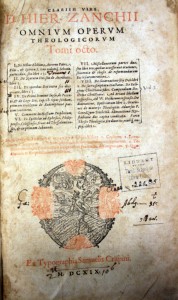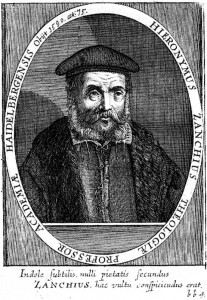Grand Rapids, MI (March 17, 2014)—The Junius Institute’s first digitization initiative of early modern sources gained important support today when the Davenant Trust announced a grant to create digital editions of the collected works of one of the most significant Reformed theologians of the sixteenth century.
 Girolamo Zanchi (1516-1590) was a third generation reformer, an exile from Italy who taught in the Reformation cities of Strasbourg and Heidelberg. His collected works, covering 8 total volumes and nearly 4,000 pages, were published after his death and exercised a major influence on the development of Reformed thought into the seventeenth century and beyond. The Davenant Trust is sponsoring the digitization of Zanchi’s Opera omnia, providing a significant beginning to the larger initiative to digitize the significant rare book holdings at the Calvin College campus.
Girolamo Zanchi (1516-1590) was a third generation reformer, an exile from Italy who taught in the Reformation cities of Strasbourg and Heidelberg. His collected works, covering 8 total volumes and nearly 4,000 pages, were published after his death and exercised a major influence on the development of Reformed thought into the seventeenth century and beyond. The Davenant Trust is sponsoring the digitization of Zanchi’s Opera omnia, providing a significant beginning to the larger initiative to digitize the significant rare book holdings at the Calvin College campus.
“We’re excited to begin our project to create electronic editions of these major sources with the complete works of Zanchi,” said Todd Rester, director of the Junius Institute for Digital Reformation Research at Calvin Theological Seminary. “Getting high-quality digital versions of these documents into the hands and onto the hard drives of scholars is the first step in moving the next generation of scholarship forward.”
This is one of the first major grants made by the newly-formed Davenant Trust, an institution formed to advance the scholarship and reception of Reformed theology in the academy and church today. “We are very excited about this opportunity to partner with the Junius Institute,” said Dr. W. Bradford Littlejohn, president of the Davenant Trust. “Their important work in the retrieval of Reformation sources dovetails perfectly with Davenant Trust’s vision of Protestant resourcement and we expect many fruitful collaborations in future. Zanchi’s work in particular should be a cornerstone of any such resourcement, and we are eager to help bring it into wider circulation.”
The digitization of Zanchi’s collected works will feature all of the significant contributions from the pen of this noteworthy theologian. And yet these thousands of pages of published text represent just a small foretaste of a larger, multi-phase project to digitize the world-class collection of rare books at the H. Henry Meeter Center for Calvin Studies and Hekman Library of Calvin College and Seminary. While the Junius Institute will continue to raise funds to eventually make available all of the rare book holdings, this initial phase will cover roughly 60 volumes and 60,000 pages of printed text.

Girolamo Zanchi (1516-1590)
Dr. Richard Muller, a senior fellow at the Junius Institute and the P.J. Zondervan Professor of Historical Theology at Calvin Theological Seminary, noted that Zanchi’s contributions to the development and maturation of the Reformed tradition are often under-appreciated. “Zanchi was one of the key figures in the later generations of the Reformation. As a younger contemporary of John Calvin, Heinrich Bullinger, and Peter Martyr Vermigli, Zanchi stands as a major contributor in a variety of areas, especially in his philosophical treatises, exegesis, and doctrinal and scholastic works,” said Muller.
Zanchi’s works, like all of the project’s digital editions, will be released under a Creative Commons license, allowing wide use and distribution for academic and scholarly purposes. The digitization initiative will also create a collection of source texts that can be used for a variety of future digital research purposes and projects.
For more information:
Jordan J. Ballor
Associate Director
Junius Institute for Digital Reformation Research at Calvin Theological Seminary
[email protected]
About the Junius Institute for Digital Reformation Research
The Junius Institute for Digital Reformation Research at Calvin Theological Seminary (www.juniusinstitute.org) seeks to further the advancement of studies in early modern (ca. 16th to 18th century) theology and interconnected disciplines through the use of digital research tools, skills, and sources; to foster the presentation, preservation, and public use of primary and secondary sources within the public domain; and to encourage via educational and curricular means the study of the documents themselves, their content, as well as the technical skills required to interpret and analyze these materials.
About the Davenant Trust
The Davenant Trust (www.davenanttrust.org) sponsors Christian resourcement in scholarship. The Trust’s aim is to revitalize contemporary Reformed and evangelical discourse by sponsoring scholarly endeavors at the intersection of the church and academy: the proliferation of the digital archive, the retrieval and translation of classic texts, the development and support of Christian study centers, and the sponsorship of individual scholars engaged in historical work for the sake of the contemporary church.





